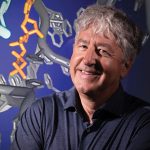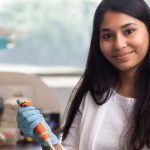Professor Satchin Panda and team, in collaboration with UC San Diego and the San Diego Fire-Rescue Department, conducted a clinical trial and found that time-restricted eating improved measures of health and wellbeing in firefighters. Eating during a 10-hour window decreased firefighters’ “bad” cholesterol and alcohol intake, as well as improved their mental health, blood sugar, and blood pressure. The researchers also discovered that time-restricted eating may provide even greater benefits for those at risk for cardiometabolic disease and other chronic diseases.
Metabolism
Salk scientists develop compound that reverses gut inflammation in mice
A drug developed by Salk Institute researchers acts like a master reset switch in the intestines. The compound, called FexD, was previously found to lower cholesterol, burn fat, and ward off colorectal cancer in mice. Now, co-corresponding authors Professor Ronald Evans and Senior Staff Scientist Michael Downes and colleagues have found that FexD can also prevent and reverse intestinal inflammation in mouse models of inflammatory bowel disease, an umbrella diagnosis that includes both Crohn’s disease and ulcerative colitis. Their research provides new, important information about the complex link between gut health and inflammation that has the potential to lead to an inflammatory bowel disease therapeutic.
Read News ReleaseTime-restricted eating reshapes gene expression throughout the body
Numerous studies have shown health benefits from time-restricted eating, making practices like intermittent fasting a hot topic in the wellness industry. Now, Professor Satchin Panda and team show how time-restricted eating influences gene expression across more than 22 regions of the body and brain in mice. The team found a system-wide, molecular impact of time-restricted eating in mice, and noted that the time-restricted eating aligned the circadian rhythms of multiple organs in the body. The findings have implications for a wide range of health conditions, such as diabetes, heart disease, and cancer.
Read News ReleaseSupplementation with amino acid serine eases neuropathy in diabetic mice
Approximately half of people with type 1 or type 2 diabetes experience peripheral neuropathy—weakness, numbness, and pain, primarily in the hands and feet. Now, working in mice, Professor Christian Metallo, Postdoctoral Fellow Michal Handzlik, and colleagues have identified another factor contributing to diabetes-associated peripheral neuropathy: altered amino acid metabolism. The researchers were able to alleviate neuropathy symptoms in diabetic mice by supplementing their diets with the amino acid serine. The findings may provide a new way to identify people at high risk for peripheral neuropathy, as well as a potential treatment option.
Read News ReleaseFeatured Stories
 Journey of a lifetime—The Cancer Center at Salk celebrates 50 years of life-changing discoveriesSalk’s Cancer Center has become a powerhouse of critical discoveries that have led to treatments and remissions for patients. The Center’s mission is to make current generations the last to see cancer as anything other than a routine diagnosis.
Journey of a lifetime—The Cancer Center at Salk celebrates 50 years of life-changing discoveriesSalk’s Cancer Center has become a powerhouse of critical discoveries that have led to treatments and remissions for patients. The Center’s mission is to make current generations the last to see cancer as anything other than a routine diagnosis.  Introducing Salk’s newest president, Gerald JoyceJoyce, a pioneer in the field of test-tube evolution, succeeds Professor Rusty Gage, who will return to his lab following a transformative leadership tenure. Joyce assumed the role April 21, 2023.
Introducing Salk’s newest president, Gerald JoyceJoyce, a pioneer in the field of test-tube evolution, succeeds Professor Rusty Gage, who will return to his lab following a transformative leadership tenure. Joyce assumed the role April 21, 2023.  Reuben Shaw—Unexpected resultsIt’s not every day a young scientist gets a jaw-dropping result he knows no one will believe. But that’s exactly what happened to Professor Reuben Shaw 20 years ago, in the spring of 2003.
Reuben Shaw—Unexpected resultsIt’s not every day a young scientist gets a jaw-dropping result he knows no one will believe. But that’s exactly what happened to Professor Reuben Shaw 20 years ago, in the spring of 2003.
 Tony Hunter—How an animal virus discovery more than 40 years ago led to one of today’s most successful cancer drugsThe story behind how Hunter discovered the first kinase that phosphorylates the amino acid tyrosine. The finding led to the development of Gleevec, a medication that is now routinely used to treat chronic myelogenous leukemia (CML).
Tony Hunter—How an animal virus discovery more than 40 years ago led to one of today’s most successful cancer drugsThe story behind how Hunter discovered the first kinase that phosphorylates the amino acid tyrosine. The finding led to the development of Gleevec, a medication that is now routinely used to treat chronic myelogenous leukemia (CML). Charles Stevens—A beautiful mind, and a heart to matchA pioneer in neuroscience, Distinguished Professor Emeritus Charles F. Stevens died peacefully on October 21, 2022, at his home in San Diego. He was 88.
Charles Stevens—A beautiful mind, and a heart to matchA pioneer in neuroscience, Distinguished Professor Emeritus Charles F. Stevens died peacefully on October 21, 2022, at his home in San Diego. He was 88. Leona Flores—Rocking cancer researchFlores had studied the design of the Salk Institute as an architectural engineering student, but never did she imagine that she would be the executive director of the Institute’s Cancer Center years later.
Leona Flores—Rocking cancer researchFlores had studied the design of the Salk Institute as an architectural engineering student, but never did she imagine that she would be the executive director of the Institute’s Cancer Center years later. Payel Mondal—Cancer researcher by day, financial planner by nightMondal is a postdoctoral researcher in Assistant Professor Christina Towers’ lab where she studies the mechanisms involved in cancer progression. Her hope is that her projects will someday be translated into therapeutics to help people.
Payel Mondal—Cancer researcher by day, financial planner by nightMondal is a postdoctoral researcher in Assistant Professor Christina Towers’ lab where she studies the mechanisms involved in cancer progression. Her hope is that her projects will someday be translated into therapeutics to help people. Salk receives $1.5 million from the Sol Goldman Charitable Trust and $1.25 million from The Jay and Sarah Flatley FoundationThe Salk Institute is grateful to its many generous supporters.
Salk receives $1.5 million from the Sol Goldman Charitable Trust and $1.25 million from The Jay and Sarah Flatley FoundationThe Salk Institute is grateful to its many generous supporters.






















































